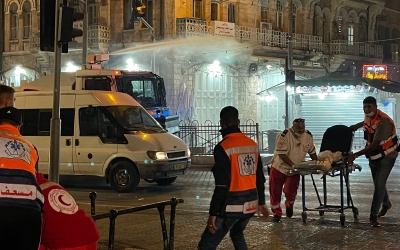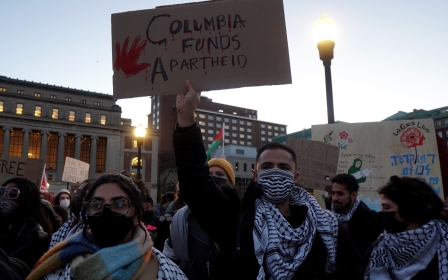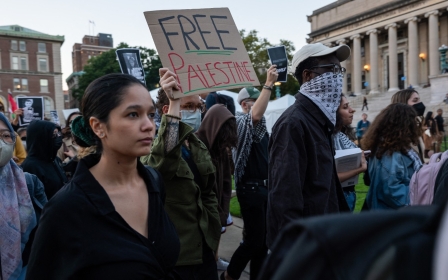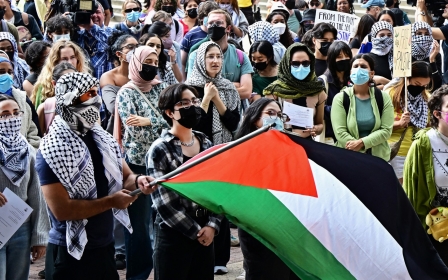'Negligence': Columbia students furious at university after skunk water doused on protesters

Students at Columbia University in New York City are furious with the administration after eight students were hospitalised after an attack with an illegal chemical-based weapon, known as skunk water, during a Gaza rally on Friday.
On 19 January in the afternoon, students gathered on the steps of Low Library to protest at a “divestment now” rally, organised by Columbia University Apartheid Divest, a coalition created after the university's director, Minouche Shafik, banned student organisations Students for Justice in Palestine (SJP) and Jewish Voice for Peace (JVP) in November.
According to a series of SJP social media posts containing victim's testimonies, a Jewish student at the protest was "verbally berated and harassed" and was called a "self-hating Jew" by two young men while holding a "CU Jews for Ceasefire" banner.
"Once they were closest to me, behind someone that was near me, I heard a little spraying around. And then it started smelling really bad," a student's testimony read.
The students currently undergoing medical care are experiencing symptoms of blurred vision, dizziness, headache, nausea, and irritated skin, even days after the attack.
One student who was rushed to hospital received a chest x-ray, a nebuliser and an electrocardiogram due to toxic chemical inhalation.
While Columbia University has sent an email to all students stating that "the NYPD is taking the lead role in investigating what appear to have been serious crimes, possibly hate crimes", and confirming that the alleged perpetrators have been identified and banned from campus, students are outraged by what they say is a lack of action and care.
The Columbia Spectator on Monday published a statement from the university administration that read: “Friday’s event was unsanctioned and violated university policies and procedures which are in place to ensure there is adequate personnel on the ground to keep our community safe.”
Columbia University told Middle East Eye that "the priority of the university administration is the safety and well-being of the members of its community. In particular, the community is reminded of the resources available – medical and otherwise - and the importance of engaging and providing information to assist in the investigation (now being led by the New York City Police Department)."
'Sustained hostile environment'
Speaking to Middle East Eye, SJP Columbia student Maryam Alwan says the attack happened due to "negligence of the administration".
"[The attack] did not happen in a vacuum, but in a sustained hostile environment for Palestinian, Muslim, and pro-Palestinian students fostered by the school for months," Alwan said.
During the protest, Columbia Public Safety and the New York Police Department were present "without doing anything to protect the protestors," Alwan added.
'[The attack] did not happen in a vacuum, but in a sustained hostile environment for Palestinian, Muslim, and pro-Palestinian students fostered by the school for months'
- Maryam Alwan, Columbia student
After the attack, students found out that one of the perpetrators of the attack had previously been reported for harassing Palestinian students at events, calling them "Jew killers" and "terrorists".
Alwan had decided not to attend the protest, saying it felt unsafe.
"I had a feeling that something would happen to me after a professor publicly doxxed me, alleging that I was a terrorist on the first day of classes." She says the administration ignored her pleas to settle that issue.
Students say they "investigated and identified the perpetrators ourselves using social media before Public Safety triggered an investigation".
A joint student investigation by SJP and JVP students published online concluded that the perpetrators are both former Israeli soldiers and current Columbia students. Middle East Eye could not independently verify this claim.
Alwan also described how students had to find their own medical advice. "Students were posting their hospitalisations on Instagram and tagging Columbia for acknowledgement in public."
Private emails in which students asked for help were left unanswered, she says.
Smell of rotting corpses
The material used during the attack, known as "skunk water", was developed by the Israeli company Odortec, and has been deployed by Israeli forces as a crowd control weapon at protests.
Its intense putrid odour is reminiscent of the smell of sewage mixed with rotting corpses, according to people who have experienced it.
Besides causing intense nausea, violent gagging, vomiting and the obstruction of normal breathing, Odortec's safety sheet indicates that it can cause skin irritation, eye and abdominal pain.
Friday's incident marks the latest in a series of measures taken against faculty and students on US college campuses protesting for Palestinian rights.
Shortly after the outbreak of the war on 7 October, the US Senate was quick to pass a resolution describing Palestinian student groups at several universities as "antisemitic, repugnant, and morally contemptible".
Numerous testimonies of students at elite universities such as Harvard, Columbia and Yale emerged, describing the devastating effects of being cast as antisemitic after speaking out against Israel's war on Gaza.
Joseph Massad, professor of modern Arab politics at Columbia University, has faced a petition for his removal after publishing a column outlining the political and geopolitical fallout of the ongoing Israel-Palestine war.
Middle East Eye propose une couverture et une analyse indépendantes et incomparables du Moyen-Orient, de l’Afrique du Nord et d’autres régions du monde. Pour en savoir plus sur la reprise de ce contenu et les frais qui s’appliquent, veuillez remplir ce formulaire [en anglais]. Pour en savoir plus sur MEE, cliquez ici [en anglais].





